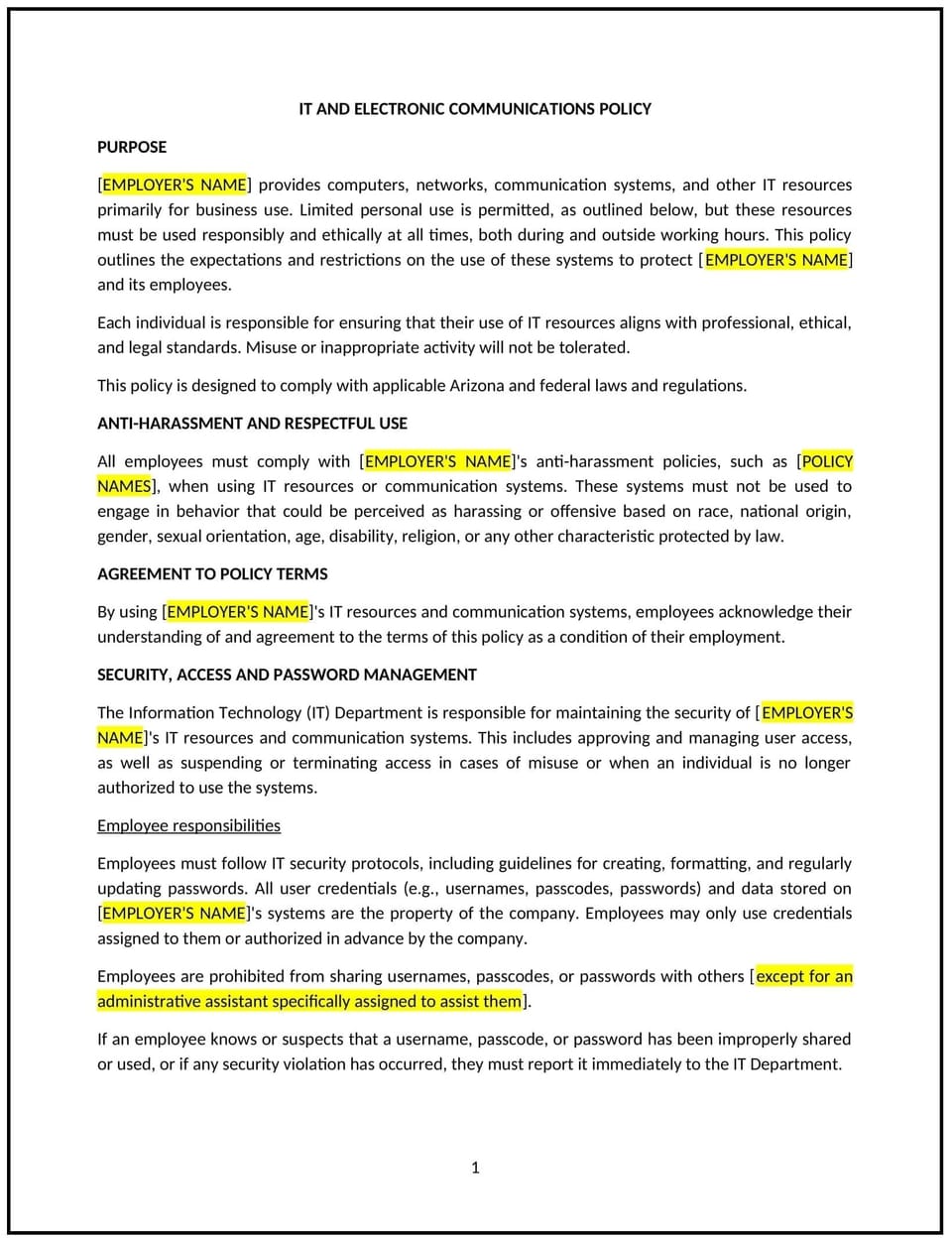IT and electronics communications policy (Arizona): Free template

IT and electronics communications policy (Arizona)
In Arizona, an IT and electronics communications policy provides businesses with guidelines for the acceptable use of technology resources, including email, internet, and company-issued devices. This policy helps protect company assets, ensure compliance with legal regulations, and maintain productivity.
This policy outlines acceptable and prohibited uses, monitoring practices, and security requirements for using IT and electronic communication tools. By implementing this policy, Arizona businesses can safeguard sensitive information and promote responsible use of technology.
How to use this IT and electronics communications policy (Arizona)
- Define acceptable use: Specify how employees may use company-provided IT resources, including email, internet, and devices, for work-related purposes.
- Prohibit misuse: Outline activities that are not permitted, such as accessing inappropriate content, downloading unauthorized software, or engaging in illegal activities.
- Include security protocols: Provide guidelines for safeguarding passwords, using secure networks, and avoiding phishing or malware threats.
- Address monitoring practices: Clearly state that the company may monitor IT usage to ensure compliance with the policy and protect company assets.
- Establish consequences: Detail the disciplinary actions that may result from policy violations, such as warnings, suspension, or termination.
Benefits of using an IT and electronics communications policy (Arizona)
This policy offers key advantages for Arizona businesses:
- Enhances security: Protects sensitive company data and IT infrastructure from unauthorized access or cyber threats.
- Supports compliance: Aligns with Arizona and federal regulations regarding data protection and employee monitoring.
- Increases productivity: Reduces misuse of IT resources, ensuring employees focus on work-related tasks.
- Protects assets: Safeguards company devices and networks from potential misuse or damage.
- Provides clarity: Establishes clear expectations for employees regarding the use of IT and communication tools.
Tips for using an IT and electronics communications policy (Arizona)
- Address Arizona-specific considerations: Include provisions for remote work, ensuring employees adhere to the policy when using company resources offsite.
- Provide training: Educate employees on recognizing phishing scams, secure password practices, and proper use of IT resources.
- Use monitoring tools responsibly: Ensure monitoring practices respect employee privacy while protecting company assets.
- Include vendor compliance: Require third-party vendors using company IT resources to adhere to similar security and usage guidelines.
- Update regularly: Revise the policy to reflect advancements in technology or changes in legal requirements.
Q: How does this policy protect the company’s IT assets?
A: The policy ensures that employees follow secure practices, such as safeguarding passwords, using secure networks, and avoiding unauthorized downloads, which protect IT systems and sensitive data.
Q: What measures are in place to prevent misuse of company resources?
A: The policy includes clear guidelines on prohibited activities, monitoring practices, and disciplinary actions to deter and address misuse of IT and communication tools.
Q: How does the company monitor IT resource usage?
A: Monitoring tools are used to track employee activity on company devices and networks, ensuring compliance with the policy and identifying potential risks.
Q: What steps should the business take to enforce this policy?
A: Businesses should provide regular training, conduct periodic audits of IT usage, and consistently apply consequences for policy violations to ensure adherence.
Q: How does this policy ensure compliance with Arizona laws?
A: The policy aligns with Arizona’s data protection and workplace regulations, ensuring the company operates within legal and ethical boundaries while managing IT resources.
This article contains general legal information and does not contain legal advice. Cobrief is not a law firm or a substitute for an attorney or law firm. The law is complex and changes often. For legal advice, please ask a lawyer.


